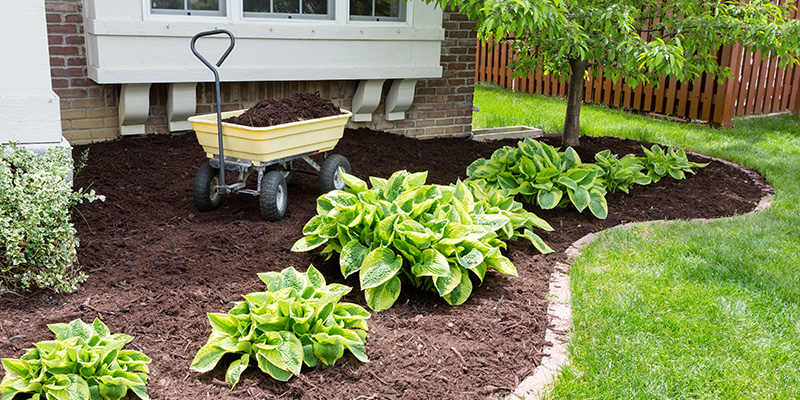Is the landlord in charge of landscaping for rental property? Or does this fall under the tenant’s responsibility? The answer is not as clear-cut as you might think.
Who Is Responsible for Landscaping for Rental Property?
A lot of tenants look for an attractive lawn and beautiful landscaping when searching for their next home, especially in bigger cities. After all, who wouldn’t want to come home to a gorgeous yard and perfectly sculpted bushes after a long day of work? But, yard care and landscaping take more time and effort than most tenants think. And some might be surprised when their landlord asks them to be responsible for yard maintenance. This begs the question, “Can my landlord make me water the lawn?”
Unfortunately, there is no answer that will universally apply to every situation. Just who bears the responsibility of yard maintenance and landscaping will depend on the lease agreement. And, as you may know, every lease agreement is different.
Types of Rental Property Landscaping Agreements
Whether the landlord or tenant is in charge of landscaping and yard care will depend on the agreement. There are three types of agreements when it comes to landscaping for rental property: self-service lawn care, full-service lawn care, and a la carte agreement.
Self-Service Lawn Care
Under this type of rental agreement, lawn maintenance falls under the tenant’s responsibility. This means they must do all the mowing, watering, weeding, trimming, and fertilizing on their own. They can also hire someone to do it for them, but the financial obligation will still rest on their shoulders.
A self-service lawn care agreement is particularly beneficial to the landlord or property manager. This is because all of the responsibility belongs to the tenant, leaving the landlord or property manager free.
But, there is also a disadvantage to this type of setup. There is always a risk that the tenant will fail to take care of the yard and landscaping as stipulated. This will result in a poorly maintained yard, which can bring down curb appeal and property value. Moreover, in some cities and local areas, a homeowner (in this case, the landlord) may be fined for failing to keep their yard in good condition. If the home belongs to a homeowners association, similar penalties may apply.
Full-Service Lawn Care
 Full-service lawn care, on the other hand, is the complete opposite of self-service lawn care. Under this type of rental property lawn maintenance agreement, the landlord or property manager takes full responsibility for yard care and landscaping. This may also include snow and ice removal, especially in areas that experience a lot of snowfall.
Full-service lawn care, on the other hand, is the complete opposite of self-service lawn care. Under this type of rental property lawn maintenance agreement, the landlord or property manager takes full responsibility for yard care and landscaping. This may also include snow and ice removal, especially in areas that experience a lot of snowfall.
This type of agreement is beneficial to landlords who are extremely picky about their yard and landscaping work. Since the responsibility falls on them, they have complete control over what plants to place and how high shrubs should be. More often than not, landlords or property managers hire a third-party professional to take care of this. But, that would also mean having to cover an additional expense, though many landlords include the landscaping cost in the monthly rent.
A la Carte Agreement
The last type of agreement is made on an a la carte basis. It is a cross between self-service and full-service lawn care. Under this setup, landlords and tenants can agree to take responsibility for certain aspects of yard maintenance. For instance, the landlord may be in charge of trimming trees and landscaping, while the tenant only needs to mow and water the lawn. The landlord may even pay part of the water bill so that the tenant can water the lawn without worry.
An a la carte agreement is often considered to be the best among landlords and tenants. This is because, instead of shouldering all of the responsibility, both parties share a portion of it.
Landscaping in Multi-Family Dwellings
Apart from the rental agreement, landlords and tenants should also consider the type of property in question. If a tenant is renting a single-family home that comes with a lawn, it would make sense for them to take care of it (or, at least, some of it). But, landlords who own and operate multi-family dwellings, are generally responsible for landscaping and any maintenance outside of the area the tenants have rented.
Ensuring the Safety and Habitability of the Home
Sometimes, local laws and HOA communities will have rules about landscaping that homeowners must follow. While the rental agreement should still reflect the discussed terms, it is generally the landlord’s responsibility when local laws or HOA rules are involved. If an unmaintained yard also interferes with the habitability of the home, landlords should step in. This is true even if the lease agreement does not stipulate the landlord’s responsibility to maintain a livable home for the tenant.
Yard care and maintenance can also be a matter of safety and security. Untrimmed trees and bushes are fire hazards to the property. Additionally, they present a place for criminals to conceal themselves. Overgrown branches can also be used by thieves to break into homes through the windows.
Can Tenants Alter the Landscaping for Rental Property?
Broadly speaking, tenants should not change the landscaping in their rental without obtaining permission from their landlord. This includes planting their own flowers or vegetables and installing a garden. If a landlord agrees to let their tenant alter the landscaping, tenants should get permission in writing. It is also a good idea to be specific about what the tenant can and can’t do. This will eliminate any potential misunderstandings down the line.
Is Lawn Care Tax Deductible for Rental Property?
While some landlords don’t like the idea of paying for lawn care and landscaping, there is a silver lining. All maintenance expenses for a rental property are tax-deductible. This includes yard maintenance and landscaping for rental properties. It is best to ask an accountant for tax assistance. Alternatively, landlords can also seek help from a property management company.
The Key to Harmonious Living
Understanding who is in charge of landscaping for rental property is paramount to a smooth and harmonious landlord-tenant relationship. Discussing the obligation beforehand and getting it all in writing will help avoid disputes down the road.
Some landlords simply don’t want to handle landscaping duties, in addition to their other responsibilities. If you feel the same way, it is time to look for a property management company. Start your search for the best one in your area with the help of Rental Choice’s online directory.
RELATED ARTICLES:
- Is Landlord Responsible For Fallen Tree?
- Pest Control In Rental Properties: Who Is Responsible?
- Water Damage In Apartments: Who’s Responsible For Fixing It?




 Company
Company